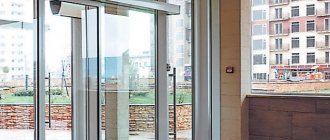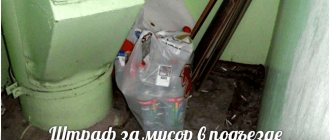Cluttering of a common corridor in an apartment building
In a house where the corridor space is shared, each of the neighbors can place their personal belongings in it.
However, often, some residents place too many objects in the corridor, which also have impressive dimensions and violate sanitary standards. As a result of this behavior, the passage becomes cluttered and sometimes it is difficult for other neighbors to even get to the front door of their apartment. Also, incorrectly placed items can make it impossible to fully open the door. A corridor cluttered with large objects not only causes discomfort in movement and gives the room an unaesthetic appearance, but is also a potential threat to the life and health of all residents for a variety of reasons. From a fire safety point of view, corridor spaces should not contain any things that could impede the free movement of people in the event of evacuation operations. After all, no one is immune from emergency situations.
Such items, which are carelessly dumped in a large pile, can serve as a wonderful place for rats, cockroaches and other organisms to breed and live, which pose a potential danger to the life and health of all neighbors. It can be very difficult and energy-consuming to remove such neighboring residents from the house.
Such situations require intervention and sometimes it is impossible to do without a complaint to the competent authorities.
We solve the problem with a compromise
It is better not to aggravate relations with neighbors and become diplomats for a while. To do this, you can invite them for a cup of coffee and ask them to clean up the common area.
If the corridor is designed for 3-4 families, you can organize a meeting. In the presence of a large number of people, unscrupulous residents will take up the task of correcting and removing the trash. They will simply be uncomfortable in front of people, and they will understand that the request is not the whim of one person.
At the meeting, you can propose ideas for improving the design of the common corridor. For example, organize a separate place for bicycles, and you can also hang them on the wall. You can install a mirror for everyone and put a stand for changing shoes. Suggestions for creating comfort will not go unnoticed.
Written request
It happens that neighbors work and are rarely at home, and it is almost impossible to catch them. The way out of the situation is to create a collective letter outlining requests to restore order. The message is placed in the mailbox or attached to the front door of the apartment.
It is important that as many residents as possible sign the appeal. Make a copy of the document, which will be proof of your efforts to create comfort and the lack of reaction from neighbors. The document is especially valuable if you go to court to solve a problem.
What is the punishment?
For violation of fire safety rules by a neighbor, administrative liability is provided in the form of a warning or a fine in the amount of one to one and a half thousand rubles. But fines for aesthetic inconveniences and problems that your neighbor’s trash causes you are not provided for by law.
Management companies and officials face more serious sanctions. For violation of the rules for maintaining residential buildings, Art. 7.22 of the Code of Administrative Offenses of the Russian Federation provides for liability, which entails the imposition of an administrative fine:
Questions and answers How to install a camera in the entrance?
- for officials in the amount of four to five thousand rubles;
- for legal entities - from forty to fifty thousand rubles.
Appeal to the district police officer
This measure can be used if neighbors not only refuse to clean up, but also masterfully avoid meeting both with employees of the management company and with representatives of the fire inspectorate and Rospotrebnadzor.
After all, if they do not receive an appropriate order to put the common area in order, then subsequently a fine cannot be imposed on them for failure to comply.
By contacting your local police department with a statement, you can solve this problem.
Reasons for disagreement
Some of the neighbors may place too many bulky objects in the space of the common corridor, as a result of which passage to other apartments becomes difficult and it becomes impossible to fully open the entrance doors.
This not only causes serious inconvenience in everyday life and spoils the appearance, but also violates fire safety rules. According to them, nothing should prevent the evacuation of residents in the event of an emergency.
Objects piled up, moreover, can contribute to the appearance of rats, cockroaches and other parasites in the living space, which can then be very difficult to remove. And if neighbors do not want to remove their things from the common corridor, then some measures will have to be taken to avoid negative consequences.
There are several ways to solve the problem, which differ significantly from each other. For some, just a simple verbal remark is enough, but for others you will have to deal with completely different methods.
So where should you turn if your neighbors have littered the entire common corridor with their things?
- To the neighbors themselves, with a collective or individual request.
- To the Management Company.
- To the Fire Inspectorate.
- To Rospotrebnadzor.
- To the court (with a corresponding statement of claim).
Fire inspection
Many of the things that residents put on the landing or in a common corridor not only interfere with passage, make it difficult to open doors and block escape routes in the event of an emergency, but are themselves a fire hazard.
Such items include old dry furniture, rolls of wallpaper, window frames, doors and much more. Most often, such construction waste appears when neighbors begin to make repairs and cannot find a better place to put everything unnecessary.
Sometimes, such a dump is formed for just a couple of days, and residents quickly take all the trash to garbage containers. But quite often, the temporary home of used items turns into a permanent one.
You shouldn’t take responsibility and throw rubbish in the trash. Otherwise, it will turn into a system. If such a situation arises, it is necessary to force the violators to vacate the common corridor on their own. Contacting the local fire inspection authorities will help with this.
In accordance with the provisions of the current Housing Code, residents of any apartment building are required to comply with fire safety rules. Storing unnecessary items and construction waste in a common area is a direct violation of them.
If peaceful negotiations have led nowhere, and the management company’s instructions are ignored, then filing a complaint against negligent neighbors can help. It is also advisable to attach a detailed photo report on the condition of the common corridor to the written appeal and indicate the period during which the neighbors are in no hurry to throw away construction waste.
Inspection staff must promptly respond to the complaint and come to the site with the appropriate inspection. Based on its results, residents who violate fire safety rules may be subject to a fine of 3,000 to 4,000 rubles. This often serves as an excellent motivation for cleaning the common corridor and taking the trash to the landfill.
If the neighbors do not react at all, the fire department can be called again. Repeatedly holding negligent homeowners accountable can have an impact.
What measures can be taken?
One of the problems of apartment buildings is the cluttering of common areas with construction waste, old furniture, baby strollers and other things that interfere with passage. Such objects make up the entrance to the basement, steps on the stairs, interfloor areas, and rooms near apartments.
There are four ways to influence neighbors:
- Peaceful conversation. Politely and as friendly as possible, ask your neighbor to remove the displayed items.
- Writing an application to the management company. If a neighbor does not make contact or refuses to remove things, you can write a statement to the Criminal Code asking them to take action. You can attach a photo of the piles in the common area to your application.
- Contact the Ministry of Emergency Situations. If the management company has not taken any measures or their methods do not work on the neighbor, you can contact the Ministry of Emergency Situations. This method involves the imposition of penalties on the violator of the Fire Safety Rules.
- Returning junk to the owner. Moving all your belongings under your neighbor's door can help.
You should be more careful with the last method. If you damage your neighbor's property, he may demand compensation from you or even bring you to administrative liability for arbitrariness.
What to do if neighbors litter the landing?
Everyone knows the rules of living in an apartment building. Neighbors should not make noise at certain times of the day or litter. They are required to maintain cleanliness and smoke only in designated areas. Compliance with the rules contributes to the establishment of peaceful relations with neighbors.
When people are faced with neighbors littering their stairwell, they have no idea what to do. It would seem, well, who can bother with a baby stroller? But if several bicycles and old window frames join it, it is impossible to pass. First, talk to your neighbors in a friendly manner, ask them to remove things that are disturbing the other residents.
If conversations with neighbors do not help, you need to call special services and draw up a report. The algorithm of actions is determined at a general meeting of residents. Typically, all residents begin their actions by calling a representative of the management company. To do this, you should write a written application addressed to the head of the company or HOA, then sign the act drawn up by the commission. The homeowner will receive a fine.
Practice shows that much larger fines are assessed when calling the fire inspectorate or the Ministry of Emergency Situations.
Is it possible to store things in the common corridor?
The legislator clearly speaks about the common property that is located in the house. It belongs to all residents on the right of common ownership. By the way, this applies not only to the territory on the floor, but also to stairs, technical rooms, elevators and even the ground on which the house stands. But this total area is proportional to your personal area located in this house.
Please note that it is not always worth complaining somewhere if neighbors litter the common corridor or create a dump. Things should block the passage and be constantly on the landing.
Lawsuit
An extreme measure to combat a cluttered common area is to file a lawsuit in court. It is best for it to be collective, drawn up on behalf of all disgruntled neighbors.
In this case, copies of letters that were sent to homeowners whose garbage and belongings interfere with the passage and turn the corridor into a dump will come in handy. In addition, it is worth enlisting the support of all authorities to which written appeals were submitted.
By presenting all this evidence, obtaining testimony and providing photographs of the general area, there is every chance of winning the trial.
In this case, careless neighbors, according to the court, will be required to remove all their belongings from the corridor. Although practice shows that just a notice of a summons to court is enough for the premises to be cleaned.
Causes of conflicts
According to the norms of the Housing Code of the Russian Federation, common premises in apartment buildings can only be used with the consent of neighbors, provided that the placement of things in them does not contradict sanitary standards (SanPiN 2.1.2.26.45-10) and fire safety (Ministry of Emergency Situations Order No. 313). Often, residents do not follow the rules and do not take into account the opinions of other residents. As a result, corridors, vestibules and other common areas are filled with various objects, including bulky ones, which creates problems and inconvenience for residents and can lead to emergency situations.
Law
Littering the common corridor, apartment hall and other public places in the building, in the long term, poses a great threat. And the point here is far from being a matter of other people’s dissatisfaction with the tenant. This poses a direct threat in the event of a fire.
Any tenant, along with his neighbors, has the right to place certain items in common areas. Things can be stored in the common corridor, but they should not obstruct passage.
Basic information that regulates the rights and obligations in the issue under consideration is contained in the following regulatory documents:
- Federal Law “On Fire Safety” dated December 21, 1994 N 69-FZ. In particular, he says that arranging closets and placing things on landings is prohibited. For fire safety purposes.
- Decree of the Government of the Russian Federation of August 13, 2006 N 491 “On approval of the rules for maintaining the common property of an apartment building.” According to the document, a citizen can complain about a neighbor littering a stairwell or other common space. As a rule, claims are accepted by the management company or housing and communal services.
- Code of Administrative Offenses or Criminal Code of the Russian Federation . These documents are aimed at suppressing illegal actions and paying a fine.
Legal documents do not provide for any penalties for an unsightly or unaesthetic appearance. This issue is decided in court and is extremely subjective.
Ask a question and get a lawyer’s answer in 5 minutes
In addition, you must not interfere with access to other rooms, stairs, fire exits, or elevators. What if neighbors litter common areas? If neighbors have crowded the landings with their belongings, making it difficult to pass, you should not ignore this.
Marina. Here you need to send a written claim to your neighbor. And you also contact the Management Company in writing. In order to provide such evidence in court later as a pre-trial settlement.
Contacting a management company or housing department (if the management company has not yet been created) is a more effective way to deal with violators, since the company has official powers.
Where common areas in apartment buildings are usually cluttered
Probably, each of us has had experience in “overcoming obstacles” during the journey from the entrance to the entrance of an apartment building to the apartment we need.
By obstacles, we perfectly understand the rubbish that residents threw from their apartments into the common area of the house.
Littering of common areas in an apartment building now happens very often.
Citizens most often leave behind the following unnecessary items:
- bags of cement and other construction mixtures, sand;
- waste after renovations in apartments (old windows, doors, partitions, plumbing fixtures, etc.);
- old unnecessary things;
- vegetables for winter storage in common converted corridors;
- other items.
The following places are most often cluttered:
- entrance to the basement from the entrance;
- steps on staircases;
- intermediate interfloor turns;
- areas near apartments.
As you can see, this list contains almost all premises that are not located in apartments.
Find out who is responsible for cutting down trees in the local area of an apartment building.
And here is information about the patent for rental housing.
Fine amount
The amount of payments varies depending on the violation and the authority:
- Fire inspection - up to 4 thousand rubles. For repeated violations, the fine increases. However, for the first time they can get by with a warning.
- Rospotrebnadzor - up to 1 thousand rubles.
- Court - depending on the specific claim.
- For organizations – up to 40 thousand rubles. The same applies to the Management Company, which maintains the house, but ignored the complaint.
- For a manager – 5 thousand rubles.
Common area - entrance, landing, vestibule, apartment hall, etc. – should not be blocked or cluttered due to sanitary and hygienic standards and fire safety regulations.
First of all, the issue is resolved peacefully. In case of refusal, complaints are sent to the appropriate authorities. Judicial practice says that the overwhelming majority of such cases end in favor of the plaintiff, but, as a rule, a simple notice is enough for the careless neighbor to remove the common corridor or landing.
Sources
- https://prososedey.ru/v-kvartire/sosedi-zahlamili-obshhij-koridor-chto-delat.html
- https://leydi-prelest.ru/semya/sosedi-zahlamili-koridor.html
- https://orenbti.ru/drugoe/chto-delat-esli-sosedi-zahlamili-obshhij-koridor.html
- https://Yur01.com/zkh/kak-zastavit-sosedey-ubrat-veschi-iz-obschego-koridora
- https://ukaz.wiki/nedvizhimost/sosedi-zahlamili-obshhij-koridor-chto-delat
- https://bytrf.ru/sosedi/chto-delat-esli-sosedi-zahlamili-obshchij-koridor.html
- https://allo-urist.com/kuda-zhalovatsya-esli-sosedi-zahlamili-obshhij-koridor/
[collapse]
Cluttering the corridor
Entrances are a common area, but this does not mean that everyone can place things in them. As for the common corridors of several apartments, residents usually agree on what things can be placed and in what quantities. Often disputes cannot be resolved peacefully.
If you look at the housing complex of the Russian Federation, you can read that common spaces in apartment buildings can only be used with the permission of neighbors and provided that the placement of things does not violate fire safety requirements and standards.
When a neighbor is dissatisfied with storing things in the entrance or common corridor, this is against the law. Littering a common corridor in an apartment building is a serious problem and becomes the cause of irreconcilable hostility. At first the neighbors try to come to an agreement peacefully, but then they begin to take action.
With a statement and photographs of the corridors, the resident of the house can contact various organizations, from the management company to the court. Neighbors begin to evade receiving orders and fire inspections, but if they received a warning twice, they face a fine.
In most cases, simply having a nice conversation with your neighbors is enough. Many people simply do not understand that fire safety rules are written in blood.
Pile of things in the hallways:
- Is very dangerous and increases the risk of fire;
- Contributes to the formation of congestion during the evacuation of people, when minutes count;
- Leads to rapid spread of fire;
- May block access to windows;
- Interferes with the work of firefighters.
The area of the common corridor and entrance in an apartment building is not a place for storing bicycles and strollers, construction waste, a large number of flower pots, unnecessary closets and other things. And every owner should know where to turn if neighbors litter the common corridor and are not ready for dialogue.
Rospotrebnadzor
This is another body that monitors the proper maintenance of apartment buildings and where you can turn to combat litter in the common corridor. It regulates compliance with sanitary and hygienic requirements, which all residents without exception are required to comply with.
When a dump is formed in the corridor, there is a significant risk of rats, mice, cockroaches and other parasites for which a variety of rubbish is an excellent habitat.
As described in the “Sanitary Rules and Standards”, littering stairwells, cages, inter-apartment passages and vestibules is strictly prohibited.
If you make a written complaint in the proper manner, an inspection will also be carried out to determine whether the premises do not comply with sanitary and hygienic standards. If a violation is confirmed, a fine will also be imposed on the neighbors.
Its amount is not so large, from 500 to 1000 rubles. However, if you simultaneously file a complaint with both Rospotrebnadzor and the local fire inspection authorities, the amount of the fine will be much more significant. In addition, an inspection from two authorities at once may turn out to be twice as effective, and residents will decide that it is better to remove the garbage than to regularly pay for its storage.
Punishment of violators
For failure to comply with safety regulations, the violator will be held accountable.
For such an offense, a citizen faces an administrative fine.
However, the first time they give only a warning and only if they repeat, a fine is imposed. The size of the sanction ranges from one thousand to one and a half thousand rubles.
If the offender is a management company, the fine for such illegal actions will be increased:
- the amount of the fine for a legal entity exceeds 40 thousand rubles;
- The fine for a person holding a leadership position is 5 thousand rubles.
Remember! The sanction for violating safety rules is specified in Article 7.22 of the Code of Administrative Offenses.
Solving the problem peacefully
When using common property, citizens often have conflicts. In such situations, the parties should try to resolve the dispute peacefully.
When neighbors block the passage, you should ask them to remove things from areas that are common.
What to do if your neighbors dog is constantly barking: who should you complain to?
You should be polite when communicating. It is prohibited to insult or threaten a citizen, as this may be perceived as a violation of human rights to honor and dignity. Usually, most people immediately put away their things after the dialogue, because when leaving objects in the corridor, they do not think about the fact that it will disturb someone.
If the violator promised, but did not take any action, then the residents should contact everyone together. Residents should not crowd to the violator; it is better to write a collective complaint. Or only one person can represent the interests of all residents.
When drawing up a claim, applicants must clearly define the requirements; they must not contradict each other.
PRO new building (Moscow)
However, it is forbidden to use public places for smoking, since neighbors are forced to “inhale the smoke of smoldering products” (Federal Law No. 87 “On restricting tobacco smoking”). Neighbors may try to sue the smoking residents or call the local police officer for an instructive conversation.
It is in these places that, most often, public areas are littered with all kinds of garbage. Therefore, it is advisable to begin a conversation about some rules for using the common property of a house by considering the legality of restructuring common areas.
After this, the management company may require the neighbor to remove all trash from the landing, warning about the possible consequences. Employees of the management company do not have the right to touch or remove other people’s things on their own. But they must react, otherwise they themselves may be held responsible later. If neighbors do not respond to the demands of the Criminal Code, more stringent measures should be taken.
Lawyer Anisimov Representation and defense in court
The use of residential and non-residential premises by those living in the house, as well as common areas, is carried out taking into account the fire safety requirements in the Russian Federation, approved by the order of the Ministry of Emergency Situations of Russia dated June 18, 2003. No. 313. Fire safety regulations are mandatory for all residents of the house 2.2. Rescue and fire-fighting equipment must not be damaged or used for other purposes.
The culprit of equipment damage is obliged to compensate for the damage caused.
2.4. It is prohibited to store explosive, flammable and combustible substances in apartments and basements, as well as to place them on stairwells.
2.5.
If a neighbor has taken construction debris into the stairwell and refuses to clean it up.
No one will constantly look after the things on display, and careless handling of fire by children or hooligans can lead to a fire. Fire is becoming a common problem that can not only cause enormous material damage, but also take someone’s life.
Responsibility for violation of fire safety rules is established by Art. 20.4 Code of Administrative Offenses of the Russian Federation.
- imposition of an administrative fine: - on citizens in the amount of one thousand to one thousand five hundred rubles; - for officials - from six thousand to fifteen thousand rubles; - for legal entities - from one hundred fifty thousand to two hundred thousand rubles.
- Warnings
2. Such actions violate the rules for maintaining residential buildings.
- maintenance (scheduled and unscheduled inspections, preparation for seasonal operation, routine repairs of structural elements and engineering systems and home equipment);
- capital
Clear announcements for management companies and residents
Especially poor people who smoke parliament and don’t have an ashtray at home. Yesterday I successfully extinguished your cigarette butt on my balcony, as well as the smoldering board under it.
Dear residents of the upper floors. Especially poor people who smoke parliament and don’t have an ashtray at home. Yesterday I successfully extinguished your cigarette butt on my balcony, as well as the smoldering board under it.
I do repairs only on weekends from 13:00 to 18:00, and I still can’t please. The pensioner opposite has a headache and high blood pressure, and a small child on top cannot sleep...
If you come to someone, then call them directly! The residents of our house, of course, will be happy to tell you where to go at midnight!
If the violator did not comply with the court order - did not remove the littered area or did not pay the fine - he may be convicted of failure to comply with judicial acts under the Criminal Code, which is a much more serious violation. Another helpful neighbors who are worried about small children. Indeed, kids can sleep not from 13:00 to 15:00, when repair work is prohibited by law, but at other times.
Rules for maintaining apartment halls
The order on the floors depends only on us residents, on caring for the common property.
1.) Do not place Construction and Household waste in the apartment hallways.
Littering common property, including floors, and placing household and other garbage is STRICTLY PROHIBITED by both regulations and Sanitary Standards.
Let's not turn our houses and floors into a real garbage dump.
In relation to persistent violators who constantly put garbage outside the door, acts will be drawn up and this offense will be recorded, for subsequent transfer to the Housing Inspectorate and Sanitary Authorities, to bring the violators to administrative responsibility, or simply to fines.
2.) Keep the halls themselves clean so that our houses do not turn into one big garbage dump.
Sources
- Timofey Nikolaevich Radko Theory of state and law in schemes and definitions; Prospect - M., 1990. - 568 p.
- Borisov A. N. Commentary on the Federal Law of February 8, 1998 No. 14-FZ “On Limited Liability Companies” (article-by-article); Justitsinform - M., 2021. - 152 p.
- Alexander Ivanovich Stakhov Administrative control and supervisory proceedings; Mir - Moscow, 1999. - 471 p.
- Alexander Anatolyevich Mokhov Russian business law in tests. Tutorial; Prospect - M., 1988. - 453 p.
- Boris Safarovich Ebzeev Man, people, state in the constitutional system of the Russian Federation. 2nd edition; Prospect - M., 2021. - 205 p.
How to correctly compose an invitation to a cleanup event
If they smoke in the entrance
The light in the compartment went out. The emergency lights blinked and glowed at full intensity. The battery display flashed red zeros at the astronauts. Cap said a few succinct words.
Please present your passport when requested by the cashier so that we can comply with the law.
You know, according to the practice of my work, we do not need to install an anti-vandal camera! here, as in the whole world, if they see that he is being watched, then the desire to misbehave immediately disappears! I think we can consider the issue of video dummies! This also has a very good effect on hooligans, and is much cheaper! According to statistics and observations, if you look at a person and follow him, he behaves better!
We would like to inform you that tomorrow morning, from 8 to 11, the heating equipment in your home will be checked.
Keep clean! Respect your entrance! Respect the work of the cleaner! Stop vandalism and uncleanliness!
A cigarette thrown by residents on the floor in a common corridor or in the courtyard area of a house causes harm to all residents of the house.
https://youtube.com/watch?v=7npH0z_TdYk
For example, the sentence “we kindly request you to remain silent” is simple, uncomplicated, the word “request” in it is the subject, “persuasive” is the agreed upon definition.
Dear guests from collective farms and villages! People sit on the toilet seat, not climb with their feet. At least take off your shoes.











